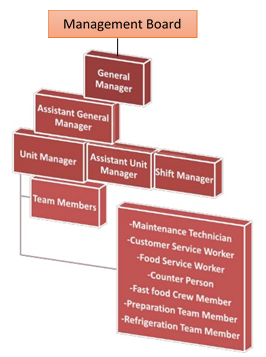The essay below uses Kentucky Fried Chicken as a case study. It investigates the organizational structure of KFC and the effectiveness of its communication system.
Introduction
Organizational communication can be defined as the communication activity within an organization. Communication can be achieved via different platforms, such as emails, memos, phone calls, meetings, teleconferencing, video-conferencing, speeches and presentations (Cheney 35).
All businesses, organizations, corporations, non-profit agencies and government agencies need proper communication structures (Arvid 10). Without proper communication structures, problems ensue; orders and instructions are not followed, there is poor service delivery and generally business cannot be done (May 32).
In this paper I have identified Kentucky Fried Chicken (KFC) Cooperation as a case study to investigate their communication structure and its effectiveness.
Background: KFC Organizational Chart
Kentucky Fried Chicken is a chain of fast food eateries founded in Louisville, Kentucky, U.S.A. KFC has been a brand since 1997. It was separated from PepsiCo forming the Tricon Global Restaurants Inc. The KFC restaurants are globally distributed and concentrate on selling chicken, sandwiches and salads. KFC also offers beef, mutton and pork based products outside North America (James 98).
Analysis: Communication, KFC, and Organization
KFC has six levels on its organizational structure. The upper most is the management board which hosts the president and the regional directors including the chief financial officer (CFO). This level is followed by the general managers, assistant general managers, Unit managers, team members and finally the workers.

From the survey, it was clear that KFC had a top down instructions and guidance system where the branch manager’s office would relay information to the unit manager’s office. The instructions would then be communicated to the workers. Communication between the managers is done via KFC portal email and finally printed out as a memo by the unit manager who shares with all the workers either by giving them a copy each or pinning it in the administration notice board at the KFC branch.
In the event that a worker has an issue, then the unit manager’s office should be communicated to directly. Feedback to the organization is to be done through the worker’s unions through teams. They can send direct emails to the general manager through the KFC portal email which is visible and is always being monitored by the regional directors at the management board level.
The management board is the key decision maker for the organization. It consists of the regional heads who sit with the company’s president. The general manager also has autonomy to make employment related decisions at a local level. He can also sort out branch issues by following closely the on-goings in the KFC unit branches. The general manager handles a certain number of units within a region.
The unit manager solely runs and manages a KFC branch. He has an assistant and a shift manager. They all answer directly to the general manager.
The KFC portal also has a customer/client feedback service, where the customers can directly feed in and send messages to the Unit manager and general manager.
Conclusion
In conclusion, KFC being a fast food products outlet, generally has a classical top down instructions communication structure (Redding 6). The use of technology and the implementation of the KFC portal is huge plus for KFC as all employees have emails within the systems. All official communication is done within the portal which is always being monitored. The workers are allowed to give feedback and raise complains directly to the general manager through the KFC portal. This is also a wonderful step towards making everyone’s voices heard (Buckley 5).
Works Cited
Redding, W. Organizational Communication: Traditional Themes and New Directions. Thousand Oaks, CA: Sage,1985. Print.
May, Mumby D. Engaging Organizational Communication Theory and Research. Thousand Oaks, CA: Sage, 2005. Print.
Cheney, Christensen L.T., ZornT.E., and Ganesh S. Organizational Communication in an Age of Globalization: Issues, Reflections, Practices. Long Grove, IL: Waveland Press, 2004. Print.
Arvid, R. J. Management, systems, and society: an introduction. Pacific Palisades, Calif.: Goodyear Pub, 1976. Print.
James, Herbert A. Organizations. New York: Wiley, 1958. Print.
Buckley, W. Sociology and modern systems theory. Englewood Cliffs, NJ: Prentice-Hall, 1967. Print.